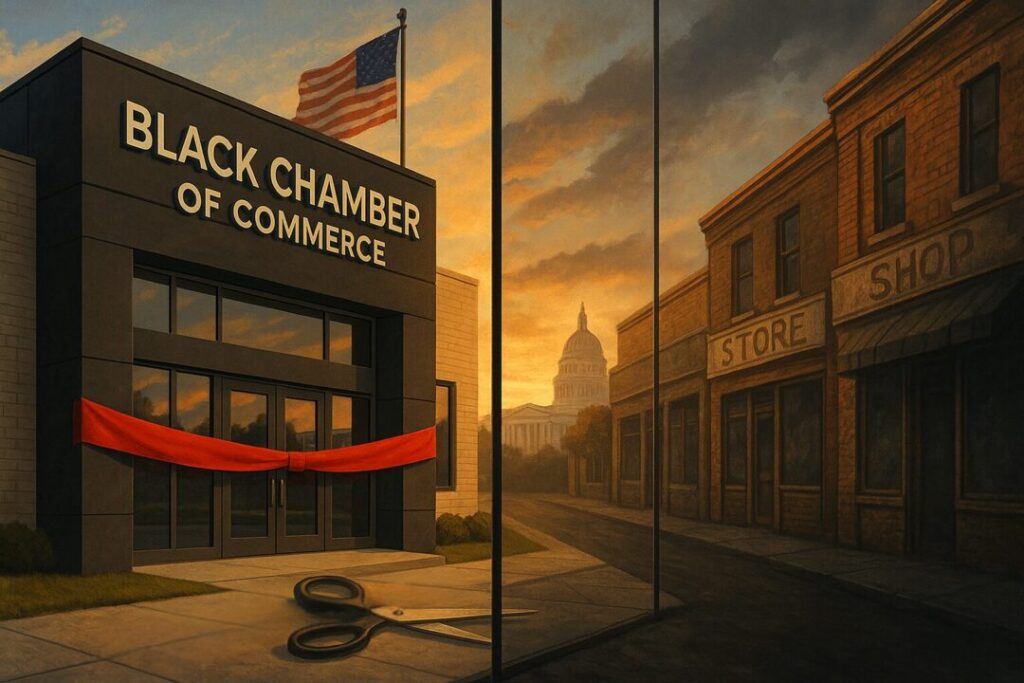On August 26, the Delaware Black Chamber of Commerce (DEBCC) cut the ribbon on its new headquarters in Wilmington. The event was celebrated by Mayor John Carney and other local leaders, but it also raised big questions about how taxpayer dollars are being spent – and whether race-based programs like this can even stand up in court.
John Carney, the former governor of Delaware and current mayor of Wilmington, announced the opening of the Delaware Black Chamber of Commerce.
This organization, which has received taxpayer-funded grants, aims to provide “economic opportunity” only to “minority and black… pic.twitter.com/IrlhzYHoTk
— Libs of TikTok (@libsoftiktok) August 26, 2025
Federal Tax Dollars at Work
The DEBCC’s expansion was supported through the Minority Entrepreneurship Grant Program Act of 2025 (H.R. 3793).
This law directs $50 million every year to business grants that are limited to applicants based on race. In other words, some business owners qualify while others don’t, solely because of skin color.
In 2023, the U.S. Supreme Court struck down affirmative action in higher education in the landmark case Students for Fair Admissions v. Harvard. The Court ruled that race-based admissions policies violated the Constitution’s equal protection clause.
If colleges can’t discriminate based on race, many are asking: why should business grants be any different?
Delaware’s Role in the Program
Delaware has doubled down. The state’s Office of Supplier Diversity helped sponsor DEBCC’s membership grant program earlier this year, although applications have already closed.
And while DEBCC founder Ayanna Khan has been praised locally (she was even inducted into the Delaware Business Hall of Fame in 2023) critics warn that these kinds of programs walk a fine legal line.
Meanwhile, the Minority Business Development Agency (MBDA) has been funding similar initiatives nationwide since 2024. These programs are designed to help minority-owned businesses, but they are increasingly controversial because of the way they exclude other business owners who don’t fit the racial criteria.
Could Nevada Be Next?
Why should Nevadans care about what’s happening on the East Coast? Because these same policies are showing up in our backyard.
Nevada has its own Office of Minority Health and Equity, along with supplier diversity programs that give preferences to certain businesses. Earlier this year, the Nevada Legislature debated bills that would expand targeted grants and loan forgiveness programs based on race.
If Delaware’s program is allowed to stand, it sets a precedent that could influence how these programs are run here at home.
Small business owners in Las Vegas, Reno, and Elko know how hard it is to get access to capital. Many feel the deck is already stacked against them when government puts its thumb on the scale.
If Washington is handing out taxpayer-funded grants but only certain people can apply, that leaves others at a disadvantage—especially in industries where margins are already razor-thin.
Fairness Means Everyone Gets a Shot
Conservatives argue the government should not be in the business of picking winners and losers based on race. A grant program should focus on helping all small businesses, whether the owner is black, white, Hispanic, Asian, or anything else.
At the end of the day, what matters most is the quality of the business idea and the ability to create jobs, not skin color.
Leveling the Playing Field, or Tilting It?
Supporters of race-specific grants say minority-owned businesses face extra challenges when it comes to accessing loans or breaking into industries where they’ve been historically excluded. They argue that targeted programs are a way to level the playing field.
But critics respond that government should remove barriers for everyone, not create new ones.
Programs based on race don’t solve the root problems of high taxes, red tape, and overregulation that hurt all small business owners, no matter their background.
The Future of Race-Based Business Programs
The opening of the Delaware Black Chamber’s new headquarters is part of a bigger national debate about how far government should go in using race as a factor in business, education, and hiring.
Here in Nevada, with small businesses driving much of our economy, from mom-and-pop shops in Henderson to ranchers in Elko County, the idea of taxpayer-funded race-based grants should give us pause.
Our state thrives when everyone has a fair chance, not when government plays favorites.
The opinions expressed by contributors are their own and do not necessarily represent the views of Nevada News & Views. This article was written with the assistance of AI. Please verify information and consult additional sources as needed.




